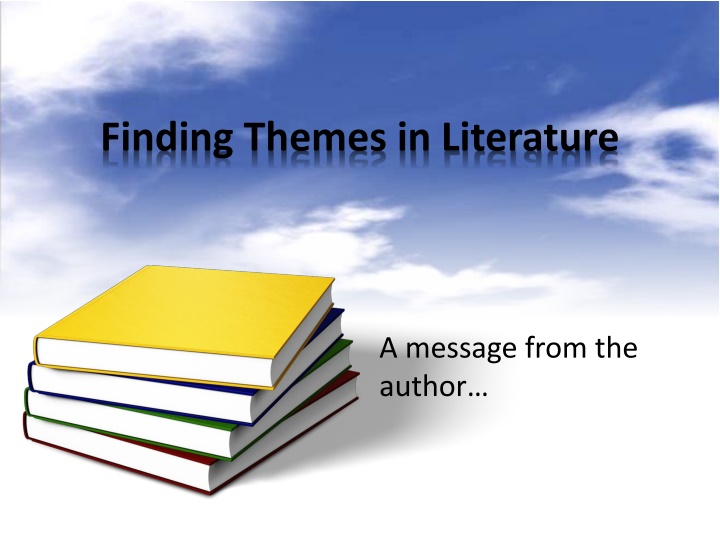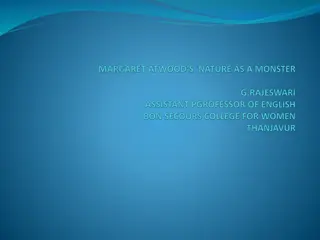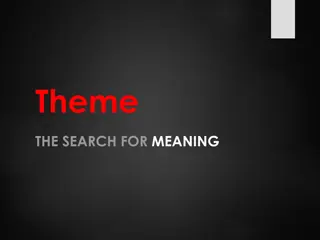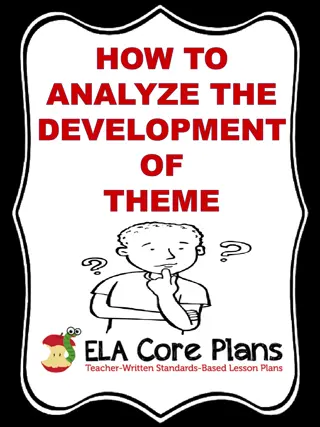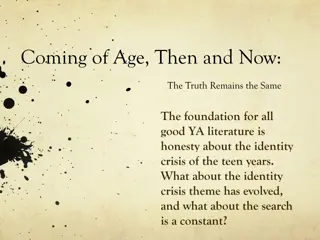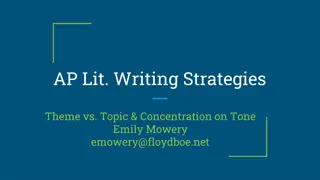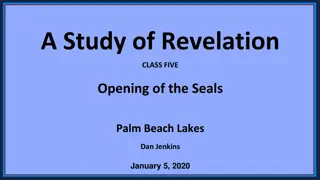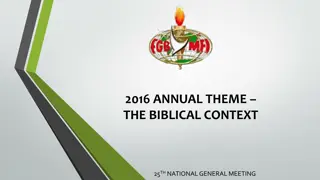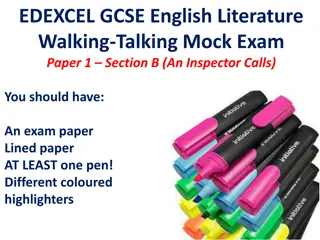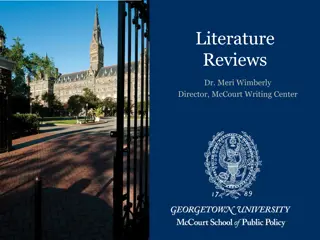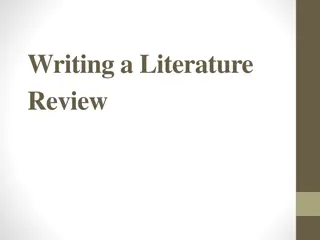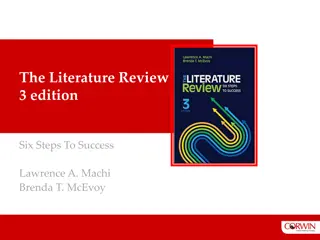Unveiling the Essence of Theme in Literature
Understanding the author's message in literature is vital for readers to grasp the underlying themes. Themes, not merely topics, convey universal truths and insights about life, human nature, and society in literary works, offering valuable lessons and perspectives on human experiences. Despite potential discord with personal beliefs, a well-crafted theme sheds light on authentic aspects of the human condition.
Download Presentation

Please find below an Image/Link to download the presentation.
The content on the website is provided AS IS for your information and personal use only. It may not be sold, licensed, or shared on other websites without obtaining consent from the author.If you encounter any issues during the download, it is possible that the publisher has removed the file from their server.
You are allowed to download the files provided on this website for personal or commercial use, subject to the condition that they are used lawfully. All files are the property of their respective owners.
The content on the website is provided AS IS for your information and personal use only. It may not be sold, licensed, or shared on other websites without obtaining consent from the author.
E N D
Presentation Transcript
Finding Themes in Literature A message from the author
The Readers Job Part of your job as a reader is to understand what the author is trying to say. Writers seldom come out and tell you, Hey, Reader! THIS is what I want you to GET from my writing. You, as the reader, must make inferences and draw conclusions about what the author is trying to express.
HEY! Whats the BIG IDEA?!! Of a literary work, that is! Themes are usually about BIG IDEAS. For example: Freedom Trust Friendship Good vs. Evil And much, much more.
So, what is theme? Theme is the message from the author. Themes can be found everywhere: Literature Art Movies The theme of a fable is its moral. The theme of a parable is its teaching. The theme of a piece of literature is its view about life and how people behave.
THIS is THEME Theme is the underlying meaning of the story. It is a universal Truth. It is a significant statement the story is making about society, human nature or the human condition.
Get to the POINT! Theme is NOT the TOPIC. Theme IS the POINT being made about the TOPIC. Theme is a statement about LIFE. A GOOD theme teaches a VALUABLE lesson about life.
Theme and Idea The theme of a literary work is its underlying central idea or the generalization it communicates about life.
Themethe meaning of life? The theme expresses the author s opinion or raises a question about human nature of the meaning of human experience.
Words of the Wise At times the author s theme may not confirm or agree with your own beliefs. Even then, if skillfully written, the work will still have a theme that illuminates some aspects of true human experience.
FindingCommon Ground The author s task is to communicate on a common ground with the reader. Although the particulars of your experience may be different from the details of the story, the general underlying truths behind the story may be just the connection that both you and the writer are seeking.
You and Theme An understanding of theme is dependent upon one s previous experience of life and literature. At the same time, theme in literature can enlarge one s understanding of life.
Be aware: The theme never completely explains the story. It is only one of the elements that are needed to gain full understanding of the story. Literary texts can have more than one theme.
Finding the Theme What is the topic or BIG IDEA of the work? The topic is The BIG IDEA is What do the characters say or do that relates to the topic? The characters say The characters do The text tells me It is important to What do these things tell you that are important to learn about life?
Common LITERARY TOPICS Not THEMES! Friendship Survival Family Love & Hate Life & Death War & Peace Motherhood & Fatherhood Poverty & Wealth Freedom Patriotism Education Homelessness Prejudice Honesty Land Laws & Justice
Characteristically Speaking Questions to ask yourself when thinking about theme and characters: How does the character change? What made him/her change? What lessons did the character learn? What are the characters feelings about what happens in the story? What conflicts do the characters engage in and what happens as a result?
Common Literary Themes Freedom Poverty Education Life Law Bravery (Themes repeated in many works)
Stranger, stop and cast an eye. As you are now, so once was I. As I am now, so you shall be, Prepare for death and follow me. (Epitaph in a European monastery) 1. The quest for immortality
Sometimes called man vs. society 2. The individual s relationship and obligation to society.
3. The individuals inward journey to understand him or herself/identity.
Sometimes called man vs. nature 4. The individual s relationship and obligation to the natural world.
5. How justice and injustice are decided.
6. The individual as hero: what it means to be a hero or anti- hero.
7. What it means to be a survivor.
8. The individuals experience of alienation or despair
9. The artists relationship and obligation to society.
10. What tomorrows world holds for us aKa The Future
11. LOVE: Marriage Romance Platonic or companionate love Altruistic love Love of Country Admiration Possessiveness Intense dependency Logical-sensible love Self-centered love Game-Playing Unrequited love Godly love Familial love Infatuation Physical attraction Jealousy
Sometimes called man vs. the institution 12. Role of Institutions
Themes? What is the theme in the Disney classic, Beauty and the Beast? What is the theme in the Disney classic, Pinocchio?
Themes? What is the theme in Disney s Monsters, Inc.? What is the theme in the classic movie, The Wizard of Oz?
Theme & Topic Match Up Courage Revenge Jealousy Dreams 1. Be careful how you treat other people; they may treat you the same. 2. Face your fears and you can defeat them. 3. Do not wish for what others possess. Be happy with what you have. 4. Work for what you want in life and you can achieve any goal. 1. _______ Revenge Courage 2. _______ Jealousy 3. _______ Dreams 4. _______
HOW TO WRITE A THEMATIC STATEMENT
Creating general thematic statements Example: Courage Courage (Thematic idea) allows people to attempt difficult (assertion about the thematic idea) tasks in their lives even when the possibility of failure is very high. (qualifying clause: when, because, unless, even, so that, whether, if, etc.)
You write one! ______________ ________________________ ________________________________________ (Thematic idea) (assertion about the thematic idea) (qualifying clause: when, because, unless, even so that, whether, if, etc.)
Allusions and thematic statements Example: Allusion: the Garden of Eden Thematic Idea: Temptation The reference to the Garden of Eden suggests that giving in to temptation may result in tragedy even if the action seems to be small and insignificant.
You try one! Example: Allusion: ________________ Thematic Idea: ________________ The reference to __________________suggests that____________________________________ ________________________________________
Creating thematic statements specific to a literary work. Think of a novel, play or short story you know well. Think of the thematic ideas that are present in that piece of literature. Choose a thematic idea word (you may use the resource list) and complete the fill-in-the-blank statement. The assertion in this statement will be directly related to the ideas presented in the work of literature.
Creating thematic statements specific to a literary work. Example: Work: Cold Sassy Tree Thematic idea: death In Cold Sassy Tree, Olive Ann Burns presents the idea that death is not only an ending but also a chance for a new beginning when those who are still alive take the opportunity to learn from it.
Creating thematic statements specific to a literary work. Work: __________________ Thematic idea: _________________ Model: In____________, ___________ presents the (Name of literary work) (Name of author) idea that ___________________________________ (assertion about what the literature teaches the reader about the thematic idea) _______________________________________ __________________________________________ (qualifying clause: when, because, unless, even so that, whether, if, etc.)
